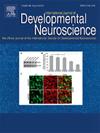Correction to ‘Agmatine Ameliorates Valproic Acid-Induced Depletion of Parvalbumin-Positive Neuron’
IF 1.6
4区 医学
Q3 DEVELOPMENTAL BIOLOGY
引用次数: 0
Abstract
Khoram-Abadi, K. M., Basiri, M., Nemati, M., & Nozari, M. (2024). Agmatine ameliorates valproic acid-induced depletion of parvalbumin-positive neuron. International Journal of Developmental Neuroscience, 84(2), 134–142. https://doi.org/10.1002/jdn.10314.
Figures 2, 3 and 4 unexpectedly contain similar images across the different experimental groups. The authors may have unintentionally mixed them up, and mistakes could have occurred during the figure assembly process.
The correct figures are provided below:
The authors apologise for any inconvenience this error may have caused.

修正“Agmatine改善丙戊酸诱导的parvalbumin阳性神经元的损耗”
Khoram-Abadi, k.m, Basiri, M, Nemati, M, &;Nozari, M.(2024)。胍丁氨酸改善丙戊酸诱导的小蛋白阳性神经元耗竭。中国生物医学工程学报,2014(2),344 - 344。https://doi.org/10.1002/jdn.10314。图2、3和4出人意料地包含了不同实验组的相似图像。作者可能无意中混淆了它们,并且可能在图形组装过程中发生错误。正确的数字如下所示:对于这个错误可能造成的不便,作者表示歉意。
本文章由计算机程序翻译,如有差异,请以英文原文为准。
求助全文
约1分钟内获得全文
求助全文
来源期刊
CiteScore
3.30
自引率
5.60%
发文量
78
审稿时长
6-12 weeks
期刊介绍:
International Journal of Developmental Neuroscience publishes original research articles and critical review papers on all fundamental and clinical aspects of nervous system development, renewal and regeneration, as well as on the effects of genetic and environmental perturbations of brain development and homeostasis leading to neurodevelopmental disorders and neurological conditions. Studies describing the involvement of stem cells in nervous system maintenance and disease (including brain tumours), stem cell-based approaches for the investigation of neurodegenerative diseases, roles of neuroinflammation in development and disease, and neuroevolution are also encouraged. Investigations using molecular, cellular, physiological, genetic and epigenetic approaches in model systems ranging from simple invertebrates to human iPSC-based 2D and 3D models are encouraged, as are studies using experimental models that provide behavioural or evolutionary insights. The journal also publishes Special Issues dealing with topics at the cutting edge of research edited by Guest Editors appointed by the Editor in Chief. A major aim of the journal is to facilitate the transfer of fundamental studies of nervous system development, maintenance, and disease to clinical applications. The journal thus intends to disseminate valuable information for both biologists and physicians. International Journal of Developmental Neuroscience is owned and supported by The International Society for Developmental Neuroscience (ISDN), an organization of scientists interested in advancing developmental neuroscience research in the broadest sense.

 求助内容:
求助内容: 应助结果提醒方式:
应助结果提醒方式:


